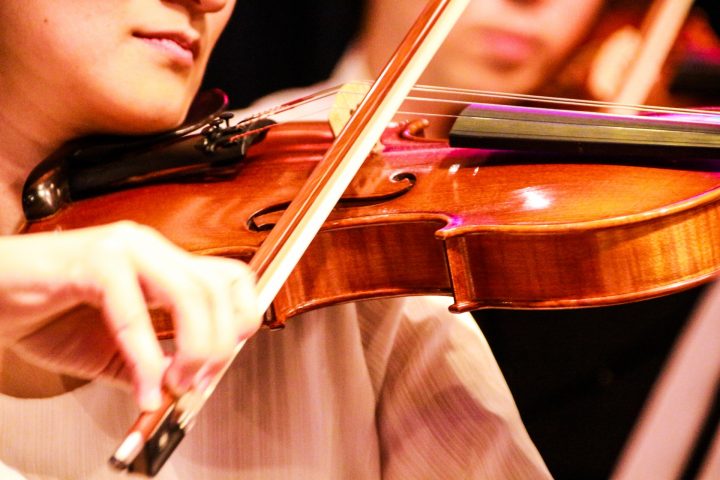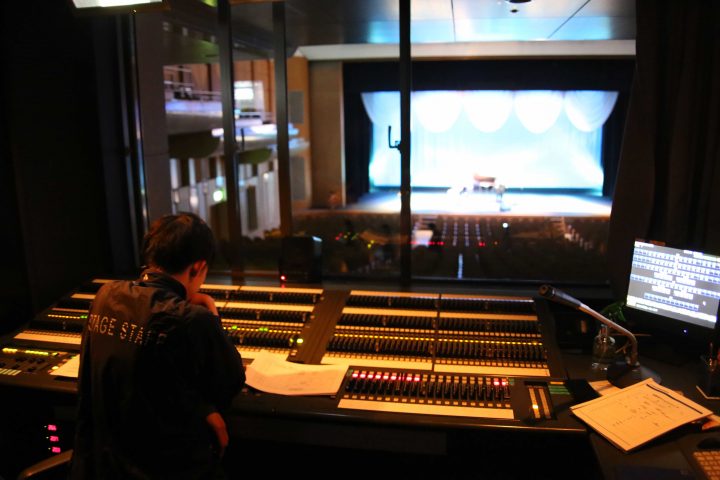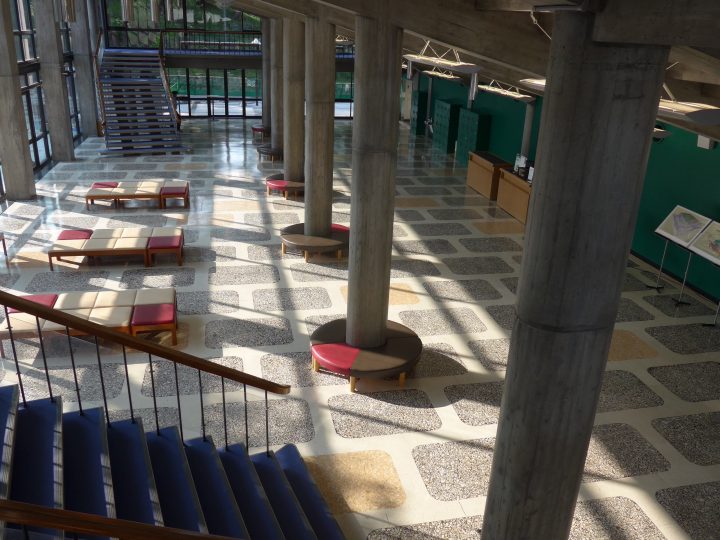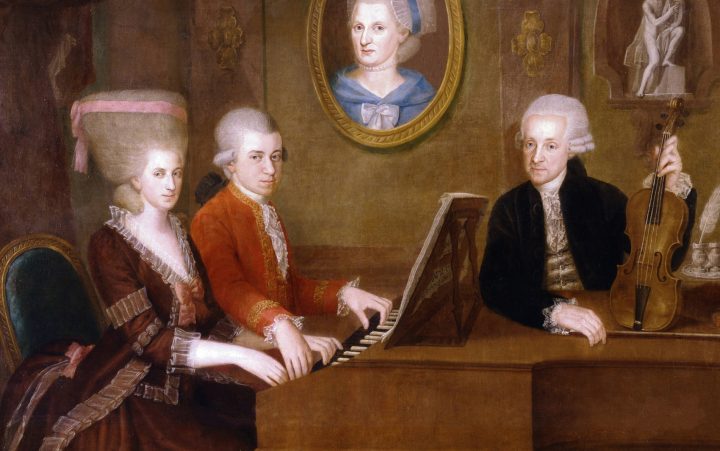Kanagawa Musical Summit (Part 2)
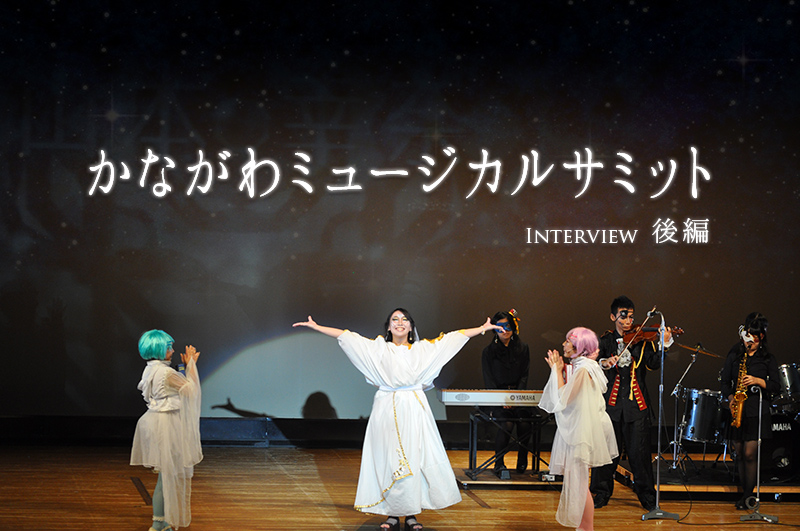
Kohoku Ward Citizens' Musical
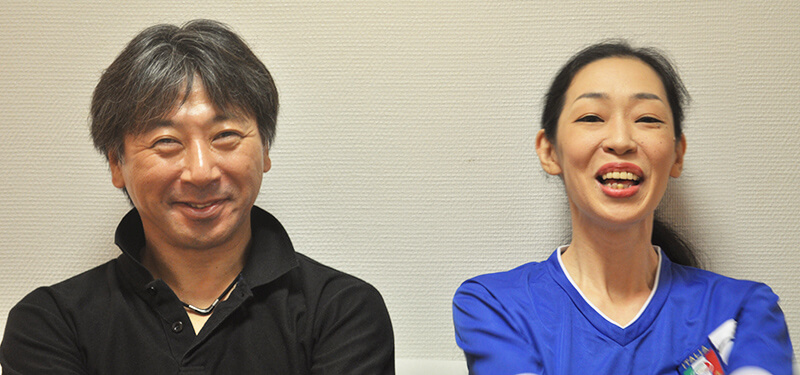
−− I was impressed by the change in focus on your website from "close to the community" to "community-oriented."
Ueda-san: If people in the area who want to do it just gather and perform, it will be like a one-time "recital" and the level of the performance will not improve. Instead, by disseminating information based on the local area and showing how creative activities are being continued here, it will create an attitude of trying to make it better than before.
There is no upper age limit for the Kohoku Ward Citizens' Musical, as long as you are a fourth grade elementary school student or older, and in the past we have had performers in wheelchairs and people with hearing impairments. Anyone who can "move their body" - or more accurately, who can "move their heart" - can participate.
The current system was established in 2005 when Junichiro was the director, but there are people who remember that there is a local Kohoku Ward Musical and look forward to each performance. They come because they feel that it was worth going to see the show, and when reservations open up, they contact the office right away. I think this is the result of the same person writing and directing for many years, with a consistent idea of "community outreach."
−− So it's not just for an exclusive group of people, but customers gather for entertainment.
Ueda: The choreography, music, and other staff are all top-notch. On stage, we have professional actors and aspiring actors. In my opinion, acting is like tennis; if you're playing against someone who's not very good at it, you can't keep it up and you won't get better. But if you play a rally with someone who's good at it, they'll put the ball in an easy spot to return it, so you can improve quickly. That's why the Kohoku Community Musical is open to professionals too.
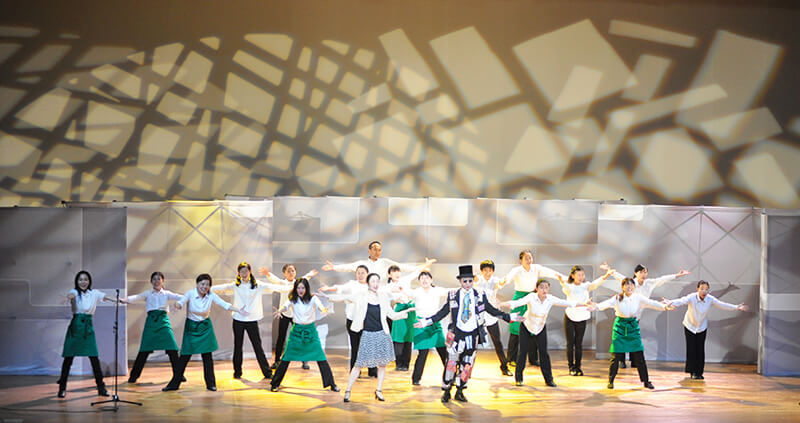
−− What is the appeal that makes professionals want to participate?
Ueda: Actually, I belong to a theater company, so I'm on the professional side. To put it in extreme terms, the professional world can have a very businesslike side, where you just need to make the scenes you're in charge of work with the people you meet on set work. But here, we spend six months preparing, the first three months doing basic training, and the last three months practicing the script. Because it takes so long, each individual gets to communicate properly. If you're a professional, even if you've never met someone before, you can do it if you're told you'll be playing a married couple, but amateurs would be too embarrassed to do it. We build from that base.
Another thing that attracts professionals is seeing everyone trying their hardest. The director, Junichiro, doesn't say "this is good enough" but rather "follow me to this point," setting high and ambitious goals. The members are crying and gritting their teeth, pleading "please do it again."
It's really wonderful to see the smiles of everyone who worked so hard when they finish the performance. I'm also amazed to see the inexperienced members grow so much. It's also a good opportunity to reflect on myself.
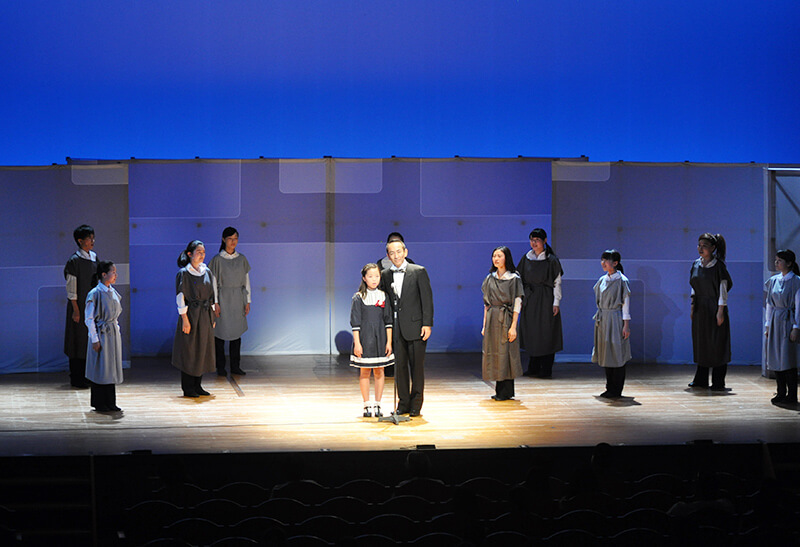
−− How do you balance the two themes of being rooted in the local community and being established as entertainment?
Junichiro: It depends on how you think about community musicals. I don't want to call it a community musical if it's just an extension of a school play, where the participants do what they can without straining themselves. I think theater is not something we do for ourselves, but something we do for the audience. It's wrong to use theater only as a means of community exchange. If we're going to do a musical or play, I think the distinctive feature of a Kohoku community musical is that it's created with the audience in mind, regardless of who the participants are.
We, the professionals, will also be there. Just like in sports, by having pros and amateurs interact, amateurs can experience the techniques of the professionals, and performing together will lead to the future of theater. Normally, professional baseball players don't play amateur baseball with amateurs, but we think that's fine. That will create the audience, actors, and backstage staff of 10 or 20 years from now, and become the future.
−− Please give a message to those who are interested in performing in a musical.
Junichiro: It's about making an effort. We may live in a self-centered age, but those who participate in this program make an effort to please the audience and to perform a good play. Overcoming difficulties that have a reason will definitely lead to personal growth, and this will be applicable not only to the stage but also to school and the workplace.
Ueda-san: The entrance is wide open, so I want everyone to try participating and feel the importance of continuing. Some people quit after six months of practice, but everyone who makes it through gains confidence and grows. I want everyone to try out and get involved until the end of the performance.
The two of them had gentle smiles on their faces, even though they spoke harsh words about working hard for the audience. The stage was a digest version of famous songs from the past works of the Kohoku Ward Citizens' Musical, and they put on a dignified performance, including a production that made the audience part of the stage and high-level singing.
Yasaka High School ARTLiVE
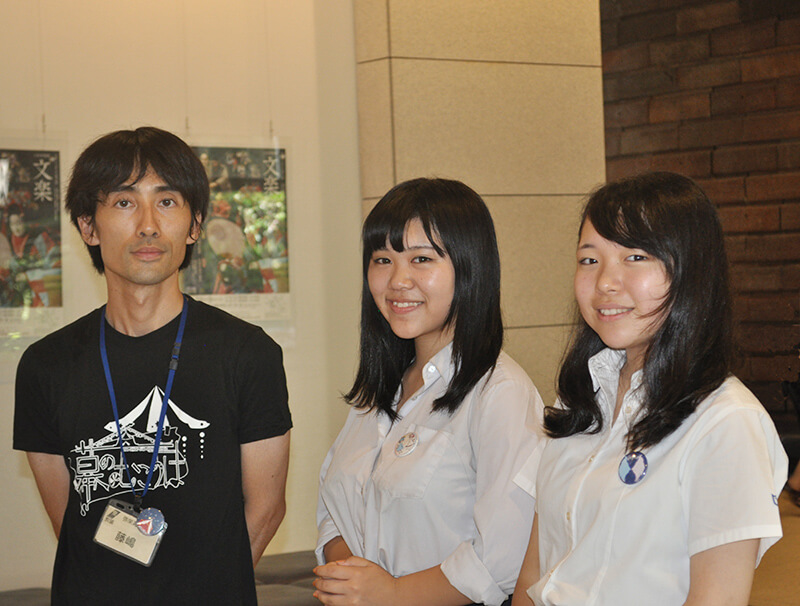
−− Please tell us what ARTLiVE is.
Tokunaga-san: It's a volunteer group performance that has been around since 2001, and it's not a club activity. At school, it's classified as an "event." Because it's not a club activity, you're free to participate in any performance, and you can join in the middle of it. The cutoff is for second-year students, and third-year students retire.
Tozawa-san: ARTLiVE is a multimedia art performance. It is a performance that combines CG, music and theater, and has a unique role of a "model" who walks and turns in time with the music.
Tokunaga-san: The content is completely different depending on the generation. There are years when there are no lines at all and only singing and dancing, and conversely, there are years when it is put together as a play, so there are various ways of expression. We are an intermediate generation of our predecessors, and our expression is a mixture of theater, CG, and singing, and we create everything ourselves, from the script, the allocation of actors, the sound, the lighting, and the music, from simple background music to lyrics and composition.
−− I saw someone with a saxophone earlier. What are your responsibilities?
Tozawa-san: I am the stage director and in charge of makeup.
Tokunaga-san: I've always played the role of a vocalist, which is mainly about singing. This time, I'm also in charge of the script.
−− Why are students able to take on so many different roles on their own?
Tozawa-san: The vertical support of the "generation" is strong, and I can meet seniors who have graduated from high school, and there is a song called "ARTLiVE" that has been passed down from the previous generation, and I am connected to my seniors through that. Also, I have to get the cooperation of my teachers in order to carry out my activities, so the connections between people in ARTLiVE are very strong.
Tokunaga: I think it's more intense than the sports clubs.
Tozawa-san: Now, when our 5th generation seniors, who are university students, come to see us, we're like, "Oh! That's the legendary senior singing that song in that video!"
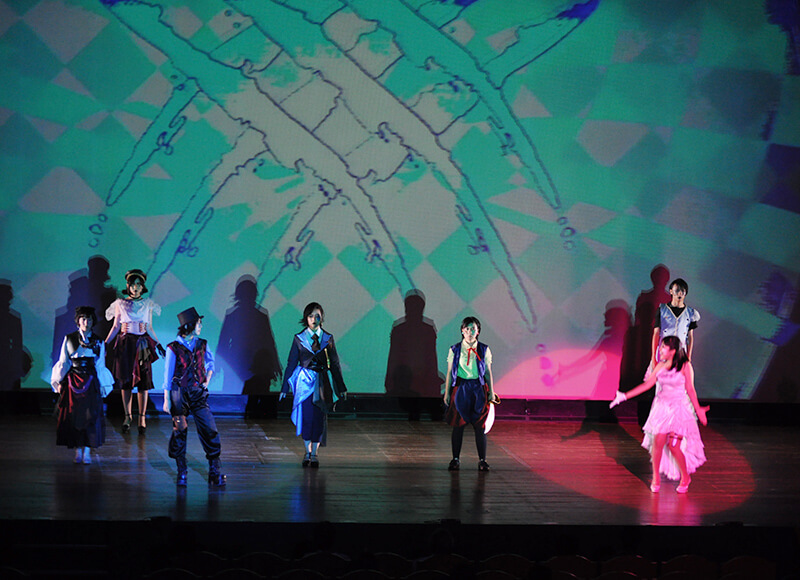
−− What is the role of the teacher?
Fujishima-sensei: I introduce the students to the people they need and manage their finances so that they can realize what they want to do. Yasaka High School only has specialized departments, and both Tozawa-san and Tokunaga-san are in the fine arts department of the arts department. There are also students from four other departments, including the music department of the arts department, the international department, and the science department, so it's hard to coordinate schedules. Each department has a different schedule and is busy, so everyone is working hard even though it's difficult to get together. It would be easy to do it myself, and I myself am eager to do it, but I want to let them do it more than that, so I encourage the students to run it on their own.
Tozawa-san: There are many different people at ARTLiVE, including those who perform, those who promote the show with posters and DVDs, those who play the sound and operate the equipment, those who make the costumes, and those who do the makeup. I think ARTLiVE is like a small company. There are many departments, and there is a person who manages them, and I strongly feel that everything comes together to become one stage. When I don't understand what I'm doing as a creator, the teacher looks at it objectively and supports me.
Even though I'm an art major, I also do singing and dancing, and when I take in things that are not my specialty, they sometimes come out in my art works, which makes me realize how important experience is.
Tokunaga-san: I feel like I'm finding my own way of expressing myself, something I wouldn't notice if I just studied in my usual major. I get to meet seniors from different majors and departments, so I feel like my expression is expanding... it's hard to put into words.
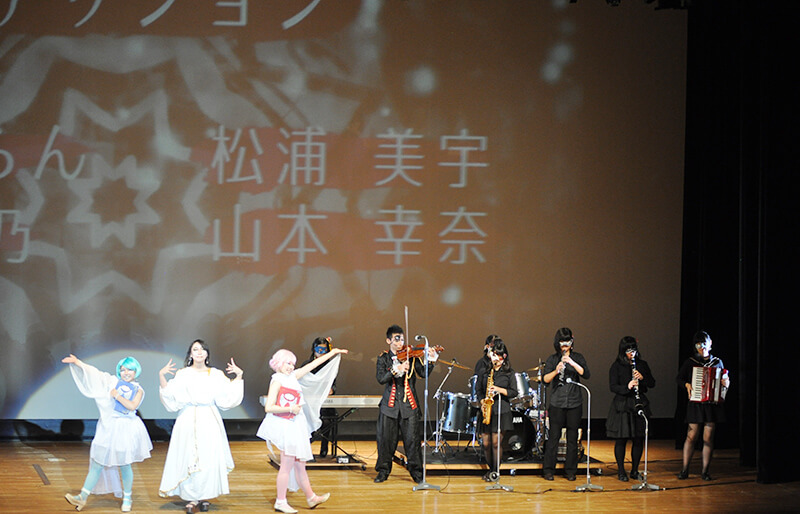
−− This work, "Behind the Curtain"
Tozawa-san: At ARTLiVE, it is traditional to use social issues as underlying themes. This play also indirectly deals with the right to collective self-defense. We discuss what is happening now among ourselves, and while thinking about what each character should symbolize, we work on the script to avoid using direct expressions. This may not be the way we write scripts. I think it is very important to choose a theme that can be confronted by high school students.
Tokunaga-san: Of course, I want the audience to enjoy the show, but I also want them to think a little. Some audience members wrote in the questionnaire that they understood the message I wanted to convey and that they were moved by it, and it makes me very happy to see such things.
The performance was unique, with videos projected on the wall behind the stage, a mysterious and hidden message, and the band onstage. The 60-minute script was edited to 30 minutes, which made me want to see the whole thing. It was an original piece that went beyond the framework of a musical, and I was surprised to see something like this being done at a prefectural high school.
The 30-minute performances by the four groups flew by in an instant, and the day left us wanting to see more. At the end of the summit, Governor Kuroiwa gave a speech, saying that there are many historic community musicals in the prefecture, and that he would like to create a place where community musicals, which tend to be limited to their local areas, can be more widely known.
